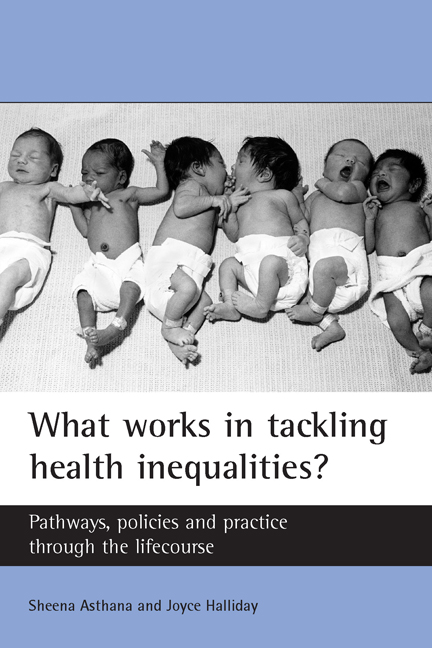Book contents
- Frontmatter
- Dedication
- Contents
- List of tables, boxes and figure
- Acknowledgements
- List of abbreviations
- one Introduction
- Part 1 The research and policy context of health inequalities
- Part 2 Health inequalities pathways, policies and practice through the lifecourse
- Part 3 Tackling health inequalities: developing an evidence base for public health
- Index
eight - Inequalities in health behaviours and the life trajectories of children and youth: research evidence
Published online by Cambridge University Press: 14 January 2022
- Frontmatter
- Dedication
- Contents
- List of tables, boxes and figure
- Acknowledgements
- List of abbreviations
- one Introduction
- Part 1 The research and policy context of health inequalities
- Part 2 Health inequalities pathways, policies and practice through the lifecourse
- Part 3 Tackling health inequalities: developing an evidence base for public health
- Index
Summary
Introduction
In the previous two chapters, we focused on pathways and policies relating to health inequalities during childhood and youth. Clear social gradients were highlighted with regard to accidents, injuries and mental health. In other respects, however, evidence of social inequality in current health status is more equivocal. Mortality due to causes other than accidents and injuries shows much less class variation. Similarly, variation in many physical health indicators is neither substantial nor consistent. As noted in Chapter Six, the suggestion that childhood and youth is a period during which a process of equalisation takes place, social variations in health status disappearing, has been linked to a postmodern account of the potentially homogenising effects of globalisation on young people, factors such as peer groups and youth culture taking on greater significance than socioeconomic background. This thesis would suggest that, due to globalisation, health inequalities based on ‘modern’ class divisions may begin to recede.
Against this, we have argued that health-damaging behaviours that are known to produce adverse health outcomes in later life are strongly subject to social gradients. Although attempts to explain socio-economic differences in unhealthy behaviours have mainly focused on adults, ‘lifestyle patterns’ tend to be established during childhood and youth. For example, early dietary habits shape later food preferences. The majority of smokers first experiment with smoking, are initiated into a smoking subculture and become addicted to tobacco during this period of the lifecourse. Similarly, major risk factors for the development of alcoholism in later life are the early onset of drinking and the heavy use of alcohol during late adolescence. The tendency to focus more attention on the health behaviours of adults than of young people has given rise to a relative dearth of information about how best to target interventions to tackle the development of problematic behaviours at this early stage (Droomers et al, 2003). Against this background, the first part of this chapter explores patterns of and risk factors associated with unhealthy behaviours during childhood and youth, with reference to diet and nutrition, physical exercise, substance use and sexual behaviour.
Continuities in health-damaging behaviours provide one important pathway linking early disadvantage to later outcomes. Continuities in socio-economic circumstances are another important reason why childhood disadvantage predicts poor health in adulthood.
- Type
- Chapter
- Information
- What Works in Tackling Health Inequalities?Pathways, Policies and Practice through the Lifecourse, pp. 281 - 322Publisher: Bristol University PressPrint publication year: 2006



